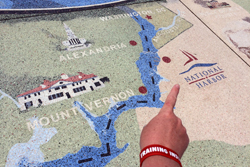Recapping the 2014 Georgetown Training Institutes
By crary@pdx.edu, July 23 2014
 Last week I traveled to National Harbor, Maryland to attend the 2014 Georgetown University Training Institutes on improving services and supports for children, adolescents, and young adults with or at risk for mental health challenges and their families, along with Reclaiming Futures Fellowship Program Manager, Christa Myers.
Last week I traveled to National Harbor, Maryland to attend the 2014 Georgetown University Training Institutes on improving services and supports for children, adolescents, and young adults with or at risk for mental health challenges and their families, along with Reclaiming Futures Fellowship Program Manager, Christa Myers.
This year the conference theme was, “Improving Children’s Mental Health Care in an Era of Change, Challenge and Innovation: The Role of the System of Care Approach” with an estimated attendance of 2,000. Below are my key takeaways.
The Youth Movement Has Arrived
 There was a great youth track at the conference – and more often than not you could hear fellow attendees in the hallways saying that these sessions were better than any others they had attended.
There was a great youth track at the conference – and more often than not you could hear fellow attendees in the hallways saying that these sessions were better than any others they had attended.
 Both Youth M.O.V.E. National and local Youth M.O.V.E. chapters were well represented, along with many other youth organizations from around the country. On Thursday night the 2014 recipients of the Youth MOVE Rockstar Awards were announced. The recipients were:
Both Youth M.O.V.E. National and local Youth M.O.V.E. chapters were well represented, along with many other youth organizations from around the country. On Thursday night the 2014 recipients of the Youth MOVE Rockstar Awards were announced. The recipients were:
- Niketa Currie, Youth M.O.V.E. North Carolina was named the 2014 Tricialouise Gurley-Millard Youth Advocate
- Dr. JoAnne Malloy, Institute On Disabilties was named the 2014 Dr. Gary M. Blau Professional of the Year
- The Kentucky Partnership for Families and Children was named the 2014 Youth Guided Organizational Rockstar
- Bruce Brumfield, Center for Community Alternatives was named the 2014 Marlene Matarese Advocate for Youth was named the 2014
- Youth M.O.V.E. Miami was named the 2014 National Chapter
- Gregory Foster was given the first ever Honorary Rockstar award for his continued dedication to youth and young adults who struggle with poverty and behavioral health needs.
And a special shout out to Youth M.O.V.E. Saginaw for contributing the soundtrack.
The Power of Storytelling
 Storytelling is critical for organizations dealing with complex issues. The Power of Story Telling: Digital Voices in a Digital Age was a special presentation on the first day of the conference. This session showcased first person narrative video stories by youth from Washington state’s Youth N Action.
Storytelling is critical for organizations dealing with complex issues. The Power of Story Telling: Digital Voices in a Digital Age was a special presentation on the first day of the conference. This session showcased first person narrative video stories by youth from Washington state’s Youth N Action.

 Juvenile Justice Reform
Juvenile Justice Reform In 2004, the
In 2004, the  For 65 years now
For 65 years now  Suicide is a critical problem for youth in the juvenile justice system. An upcoming webinar,
Suicide is a critical problem for youth in the juvenile justice system. An upcoming webinar,  Last week the
Last week the  Greetings from the Children’s Mental Health Research and Policy Conference, hosted March 2-5, 2014, by the Department of Child & Family Studies at the University of South Florida.
Greetings from the Children’s Mental Health Research and Policy Conference, hosted March 2-5, 2014, by the Department of Child & Family Studies at the University of South Florida.  Congratulations to Reclaiming Futures founder and former national director Laura Nissen on her
Congratulations to Reclaiming Futures founder and former national director Laura Nissen on her  A new report, “Better Solutions for Youth with Mental Health Needs in the Juvenile Justice System [
A new report, “Better Solutions for Youth with Mental Health Needs in the Juvenile Justice System [ MENTOR: The National Mentoring Partnership
MENTOR: The National Mentoring Partnership Will yours be one of five states selected to receive expert technical assistance to help young people? You won't know if you don't
Will yours be one of five states selected to receive expert technical assistance to help young people? You won't know if you don't  It's no secret that adolescence is a time of transition with unique challenges and pressures for both girls and boys. The Girls Matter! webinar series aims to turn the attention to how these challenges and pressures affect adolescent girls. One in four adolescent girls experiences a behavioral health problem, but research shows a gap in services, support, and important behavioral health care for adolescent girls—the very tools that help girls successfully transition into adulthood.
It's no secret that adolescence is a time of transition with unique challenges and pressures for both girls and boys. The Girls Matter! webinar series aims to turn the attention to how these challenges and pressures affect adolescent girls. One in four adolescent girls experiences a behavioral health problem, but research shows a gap in services, support, and important behavioral health care for adolescent girls—the very tools that help girls successfully transition into adulthood. Did you know that around 70 percent of all youth in contact with the juvenile justice system have a diagnosable mental health disorder?
Did you know that around 70 percent of all youth in contact with the juvenile justice system have a diagnosable mental health disorder?